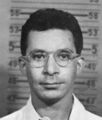Template:Selected anniversaries/May 21: Difference between revisions
No edit summary |
No edit summary |
||
| Line 25: | Line 25: | ||
||1894 – The Manchester Ship Canal in the United Kingdom is officially opened by Queen Victoria, who later knights its designer Sir Edward Leader Williams. | ||1894 – The Manchester Ship Canal in the United Kingdom is officially opened by Queen Victoria, who later knights its designer Sir Edward Leader Williams. | ||
||Camillo Herbert Grötzsch (b. 21 May 1902) was a German mathematician. He was born in Döbeln and died in Halle. Grötzsch worked in graph theory. He was the discoverer and eponym of the Grötzsch graph, a triangle-free graph that requires four colors in any graph coloring, and Grötzsch's theorem, the result that every triangle-free planar graph requires at most three colors. | |||
||1911 – Williamina Fleming, Scottish-American astronomer and academic (b. 1857) | ||1911 – Williamina Fleming, Scottish-American astronomer and academic (b. 1857) | ||
Revision as of 07:08, 30 November 2017
1471: Painter, engraver, and mathematician Albrecht Dürer born. He will introduction of classical motifs into Northern art through his knowledge of Italian artists and German humanists.
1670: Astronomer and physicist Niccolò Zucchi dies. He published works on astronomy, optics, mechanics, and magnetism.
1923: Mathematician and academic Armand Borel born. He will work in algebraic topology, and in the theory of Lie groups. He will contribute to the creation of the contemporary theory of linear algebraic groups.
1932: Bad weather forces aviator Amelia Earhart to land in a pasture in Derry, Northern Ireland, after flying solo across the Atlantic Ocean.
1946: Physicist Louis Slotin is fatally irradiated in a criticality incident during an experiment with the demon core at Los Alamos National Laboratory.
1953: Logician and mathematician Ernst Friedrich Ferdinand Zermelo dies. His work had major implications for the foundations of mathematics; he is known for his role in developing Zermelo–Fraenkel axiomatic set theory, and for his proof of the well-ordering theorem.





